I have come to conclude that in Mexico the window to a man’s heart, his past and his future, may be read in the qualities of his moustache. That upper lip pompadour, that nostril hula skirt, has remained a la mode sans irony among the Mexican elite and its aspirants long past its abandonment by other cultures. This can be a confusing and uncanny cultural through-the-looking-glass phenomenon for those to whom the moustache signifies the kind of person likely to stare at you for uncomfortable durations of time in public and/or whose shorts are so much shorter than the norm as to skew the national average.
By contrast, a man wears a moustache in Mexico to signify his final metamorphosis into adulthood and responsibility. It also comes to signify qualities of character. The level of authority a man wields, and the probability for flexibility in its exercise, may be measured by the bushiness of the moustache. Likewise, the care and design of the lower corners betoken fastidiousness and professional success. The landscaped vertical height and carefully manicured amount of droop symbolize membership in societies mysterious to the outsider, and gradients of color, be they gray or yellow, connote prior life choices, burdens borne, and the march of years.
You can read a man’s moustache and see how he got to where he is and where he is likely to go from that point forward. Such markers can be useful signposts to the wayfaring traveler, particularly when one finds himself in an argument with an armed police officer on the wrong side of the law.
Harmony and I had selected the Tenacatita anchorage from the Cruiser’s Shopping Catalog (i.e., the Shawn and Heather Mainland Mexico Cruising Guidebook) as one of the few stops we’d be making as we hustled down the coast. It was so chosen because it promised that at the end of a shadowy labyrinthine estuary tour, you could tie your dinghy up to a dock on a lagoon and emerge into the forgotten little village of Tenacatita for majestic vistas, a few staple foods, and maybe a meal at a palapa on the beach. This sounded a whole lot better than the succession of tourist resort hubs that seemed to occupy the majority of the mainland coast, and Harmony in particular was looking forward to meeting the people in this little beach town. I just wanted to be swallowed up in the shade of overhanging trees of the estuary, with maybe a beer at the end. Something for everybody.

We left Serenity in Miss Nomer, our folding dinghy, and made it over the surf line into the estuary, though not before taking a wave over the side that temporarily knocked out our outboard motor before the miles-long tour could begin. We were undeterred as Harmony started rowing and I worked on the motor (i.e., pull the rip cord a bunch of times, wait five minutes, repeat). Luckily we were soon back in business and cruising through the overgrowth.
About halfway in, we ran into another dinghy full of travelers who’d stopped in Tenacatita on their way north. During our conversation they mentioned hearing something from another cruiser about the village having recently been bought up by a federal politico, turned into private property, and now being defended against trespassers by the army. Or “an” army — the information was not precise. We remained undeterred, chalked it up to a cruiser’s folk tale, and carried on.
We passed through the jungle
scene, spotting alien looking crabs hanging from long finger-like
tubes that dipped from the trees like drinking straws into the stream. I
had a feeling that there could be crocodiles in there somewhere, as
there was a croc refuge at another anchorage not far away. The twists
and tight spots led us along for almost an hour before terminating in a
snarl of branches that marked the end of the line for our beat up little boat.
We
had seen no lagoon, nor a dock, nor a village. I was crafting a
disappointed email to Shawn and Heather in my head. But we could hear the ocean
through the thick foliage overhead. As we backtracked, we discovered a
soft mud beach, just large enough for our dinghy, with what looked like a
trail running up into the sunlight. We rowed over and hopped out to tie
up. Our feet sank two inches into the muck and belched out an organic
stench.
Harmony tied our
line to a felled log, and I stepped over it to discover that the ground
glittered with multicolored glass from a hundred broken bottles. At this
point, a shadow of doubt crept in. I asked Harmony what she thought of
the omen before us and she breezily supposed that this is where the fishermen come to party. Part of me wanted to agree with her, but the wiser part
saw this as an international symbol for stay the f*** out. So, we put
our bags back in the boat, shoved off, and went back home.
I’d like to
tell you that’s what we did.
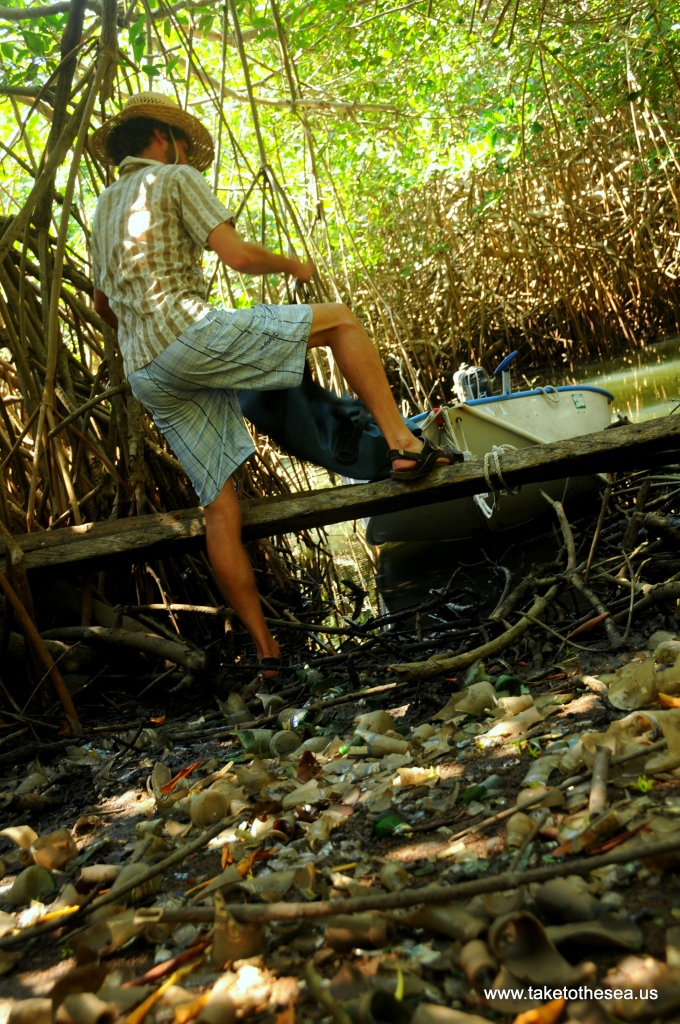
We emerged from the little
trail onto a wide terra cotta boulevard that ran parallel to a long,
curving golden beach. There were a few wood houses sparsed out to our
left, and off to the right at a distance stood what must be the village
that the book had advertised. Only something seemed off. It looked like
several of the homes had been razed, leaving concrete foundations
behind, and the few remaining homes looked both too rich and too deserted. We
didn’t see anything that looked like a restaurant, or a store, and down
one of the side paths we discovered the lagoon that the book had
promised — fenced in and cut off from the remains of the town.
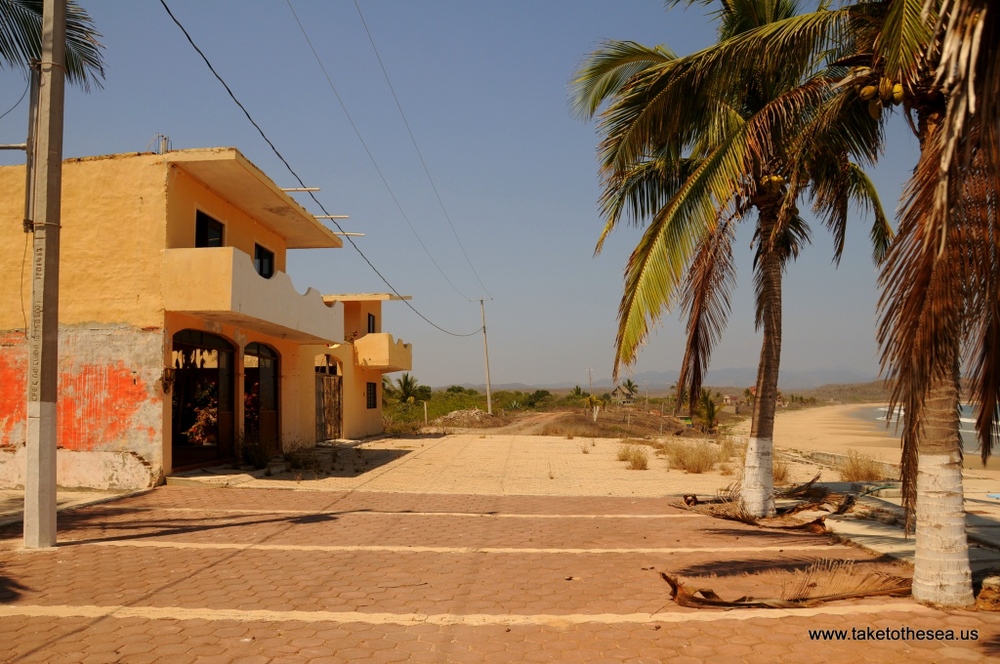
It was an eerie scene, yet
there were a handful of shirtless people hanging out on the beach, and a
couple of the homes looked sort of lived-in, so we decided to finish
our walking tour of this strange ghost town, take a dip in the ocean,
and head back to the dinghy.
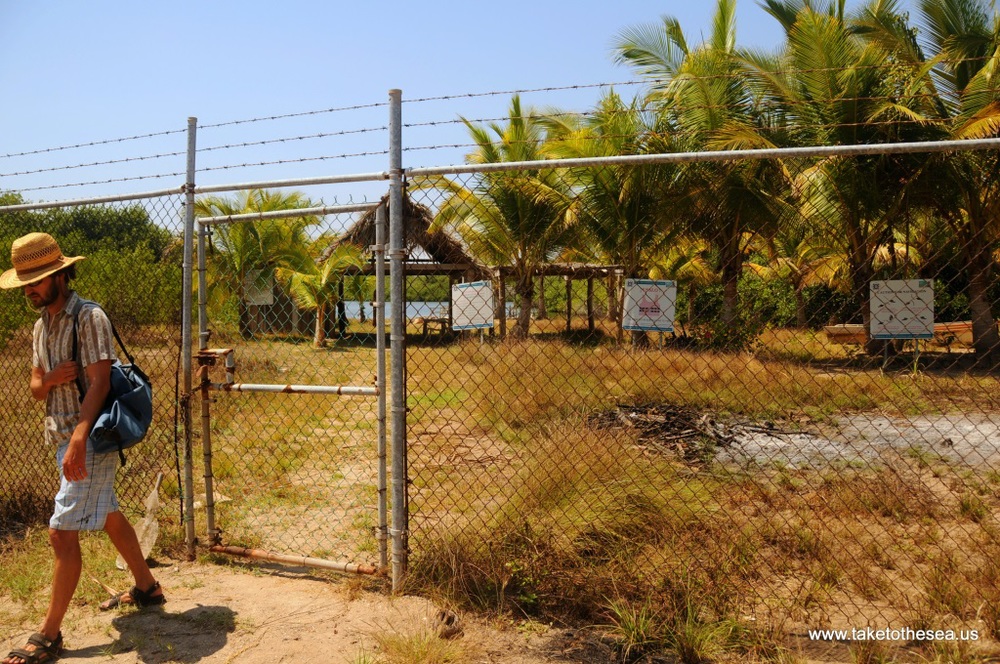 There’s the lagoon.
There’s the lagoon.
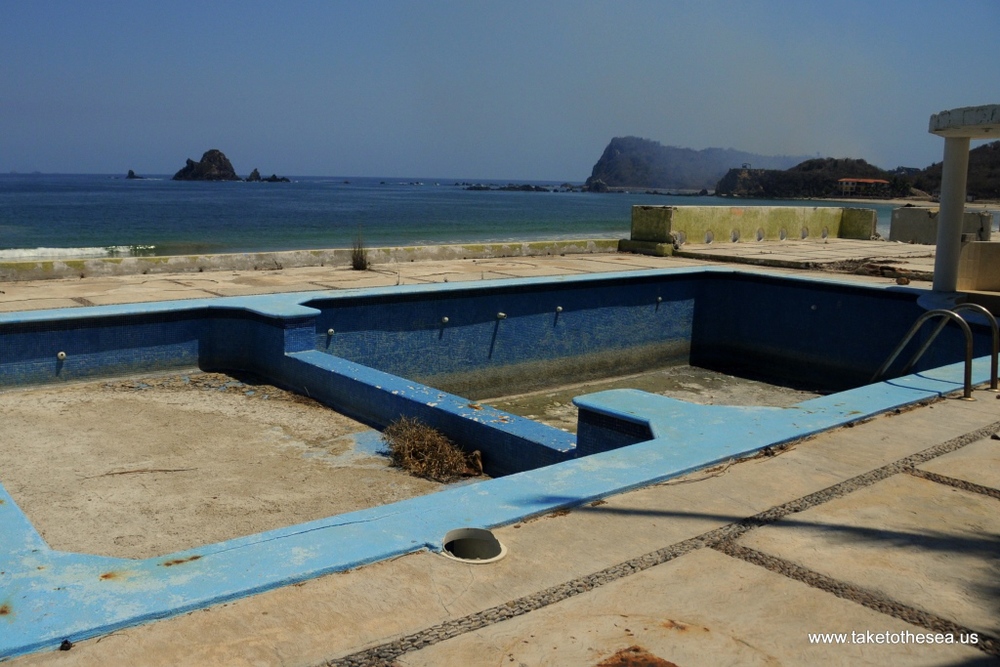
Toward
the center of town we noticed a younger guy in a pink polo shirt (no
moustache) hanging out in the shade of an overhang, playing on his
phone. He didn’t take much notice of us until we passed by with a smile
and a “buenas tardes,” at which point he came over and began to ask us innocuous
questions. Where had we come from? What were we doing here? How did we
hear about this place? We answered each in our best Spanish, which is to
say not very good Spanish, at which point Harmony asked, “Is there a
problem?” Without answering, he pulled out the radio at his hip and
began to relay our answers to someone on the other end. This in turn
set into motion a cloud of dust from the ridge overhead. The cloud
became an SUV as it tumbled to a stop in front of us, and out through a swirl of windswept sand stepped
the man in charge.
“Vamanos,”
he said with a smile incongruous to his imposing entrance, then made a walking gesture with his
fingers. “Let’s go. You must leave. Let’s go to the highway.”
We
didn’t know how far away the highway was, but given that we could hear
no sound of cars, it did not appear to be close. Our dinghy sat at the
edge of the village, deep in the estuary, miles from where Serenity lay
at anchor the next bay over. I did not relish the thought of telling
this man that we would not be able to follow his instructions.
He
was taller than me, bigger, polo shirt, cargo pants, with a gun on his
hip and combat boots. The polo shirt had the seal for the state of
Jalisco. In this bright sun he was not wearing sunglasses. His demeanor
was that of an exasperated parent who had many stupid children, so it
was with great interest and hope that I scrutinized his moustache for better
clues to resolve our dilemma. It was large in surface area, clipped
short like a crew cut, and squared at the corners like a salt and pepper
badge on his sunbeaten face. It showed no signs of sweat. This moustache was official, yet pragmatic
for its environment. I thought to myself: I can work with
this.
He repeated his orders: “Vamanos. Let’s go! To the highway!”
To
leave by the highway would mean abandoning our main mode of travel to
and from the boat, not to mention an outboard motor that was worth its
weight in gold. We would not leave another man behind. Remember how I
said that my Spanish is still really bad (despite a Spanish minor, go
figure) and I feel like an idiot every time I open my mouth? Yeah. Well.
This would be fun.
“Is
there a problem?” I asked. Switching to Spanish also, he informed us that
this entire village had been declared private property, and we were
trespassers, and we had to leave right now.
Okay, I said. We’re sorry, we didn’t know. We’ll leave, but our dinghy is in the estuary and we need it to return to our boat.
At
this juncture he pulled out what I guessed to be his favorite of the
few English phrases he had clearly perfected with care: “It’s not my
problem! Es your problem.” He repeated again, losing his smile, “You need to go to the
highway.”
I pointed toward the estuary. You’re saying we can’t leave the way we came in?
No. You’re on private property. You need to leave immediately.
We didn’t understand. There were no signs.
Not my problem! How did you get here? Where did you come from?
I explained as best I could about the guidebook, the promised estuary tour, and the little path we had found.
“That was private property,” he said again. Our conversation was becoming gradually louder and more rapid.
“We
didn’t understand!” I repeated, one of my own favorite phrases. “Where
is the line for the private property?” In my mind I imagined that if we
could just inch our way to the other side of that imaginary spot while we were talking, we could just walk away.
“You crossed the glass on the ground?” he asked.
Uh oh. “Yes we crossed the glass.”
“That was the line.”
Logos, ethos, pathos, I thought to myself. These are the three tools of persuasion.
“We didn’t understand the significance of the glass. There was no sign,
no words. If we had known, we would not have come onto private
property. Our guidebook is used by many people, and it indicated that
this place was public. Please, our dinghy is very important to us. We
don’t want to lose it.” Harmony piped up desperately: “We can leave and
never return!”
I could feel
the reach of my Spanish exceeding my grasp as I tried to conjugate verb
tenses on the fly, fairly sure that I had botched it.
He renewed his smile and said again, “It’s not my problem.”
I
could see why it was his favorite English phrase. I imagined his moustache pulling his lip to form the words like a practiced
puppeteer. The phrase was undoubtedly of great use against the countless protestations of all of the clueless,
entitled American tourists he must have shooed off this land in the last
four years. Yes, by the way, four years. 2009. This is how outdated our information was. Pay no
attention to the warning we had received earlier that day.
At
this point I was freewheeling and backpedaling, but gaining no ground
with the man. I decided to pull out a phrase that I’d been working on in
the precise event that we got into an altercation with the police.
Curious that this is one of the scenarios I’d actually foreseen and thought prudent to prepare for. You
know what they say about cop’s kids.
I
lowered my voice, leaned toward him, and said slowly and with as much
empathy as I could manage, one reasonable guy to another: “No queremos ningunas problemas con usted.” [We don’t want
any problems with you.]
He
turned his head a fraction to look at me directly, his expression
inscrutable, his cropped moustache glistening and twitching in a rapid unreadable
semaphore. I didn’t know what I had just accomplished. This phrase was
intended to mean that we had no desire to cause him complications or
question his authority. With the benefit of hindsight, I can see that
from a certain point of view it might have sounded vaguely like a
threat.
He again repeated
that it was time to go, and that our problems were not his problems. I
was defeated. I touched Harmony’s arm and motioned her to come with me
toward the highway. As one final aside, I said to her, clearly, in Spanish, “It
looks like we are going to lose our dinghy.” One more time the officer motioned
with his arms and said, “vamanos,” only this time it looked like he was
pointing toward the estuary instead of the highway. Wait a second. Did
we see that right? Harmony and I looked at each other, then back at him.
“We can go?” We pointed to the estuary also.
He gave one last underhand wave of dismissal. “Yes, yes, go.”
We
thanked him profusely and booked it for the edge of town, counting our
blessings. Harmony, rebel that she is, still paused once or twice to
take a final few pictures.
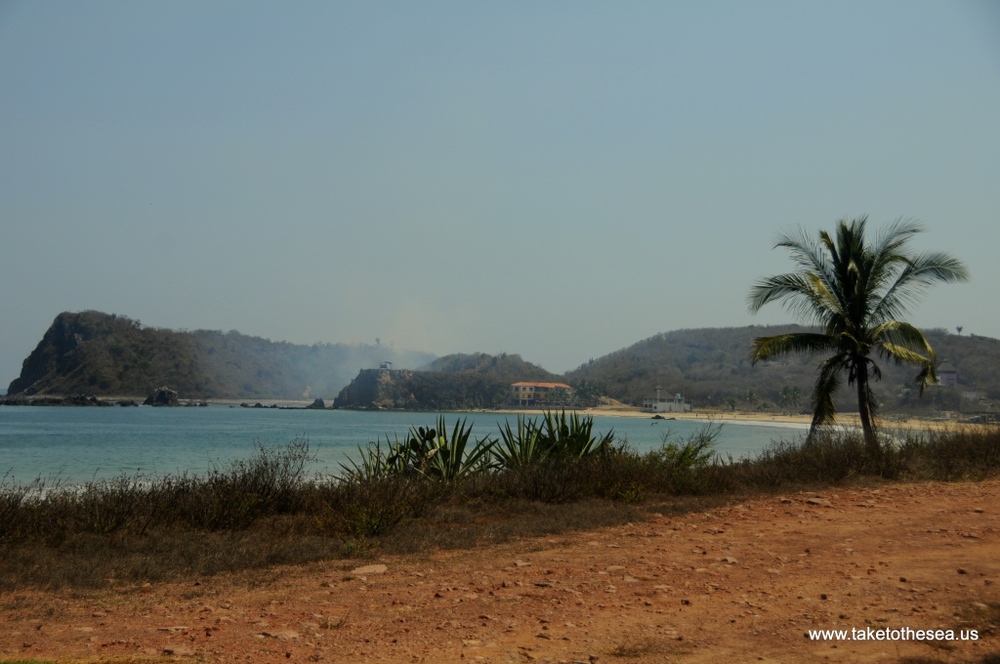 What were they burning over there? Secrets?
What were they burning over there? Secrets?
“I have no idea why he let us go,” I mused as we picked our way back across the completely obvious glass minefield.
Harmony agreed. “Right up to the end, I was sure we were going to have to walk. I wonder why he had a change of heart.”
Weeks
later I still don’t know how we got out of that one. Maybe he was
waiting for a bribe until realizing that we were too dense to offer one.
Maybe he took pity on the poor ignorant kids, not realizing that we are actually a little too old to play the ignorant kid card. It wouldn’t be the first
time that tactic has cleared obstacles for us (see Harmony’s upcoming
post about our trip to Guatemala). Maybe the growing sheen of sweat above his lip meant that he just wanted to be back in his air-conditioned SUV and not deal with
the hassle anymore.
Or maybe his
moustache and my bushy beard negotiated an understanding as our mouths
and ears talked past each other. Maybe they were doing the talking all
along.
——————————–
Bit of a stretch on that moral huh? Had a feeling. Watch this for no good reason: https://www.youtube.com/watch?v=0UxVdwadTDY
Hmmmm wonder which Cartel Drug Lord owns the spot now…
Wow – what a story you two! I was tense until the end. I can’t even imagine having to leave your dinghy behind. Terrifying, really. Glad it all worked out in the end! We miss you two.
– Katie and Mark
Yeah, Jeff captured the anxiety pretty well. My palms still get sweaty thinking about it. We miss you too!